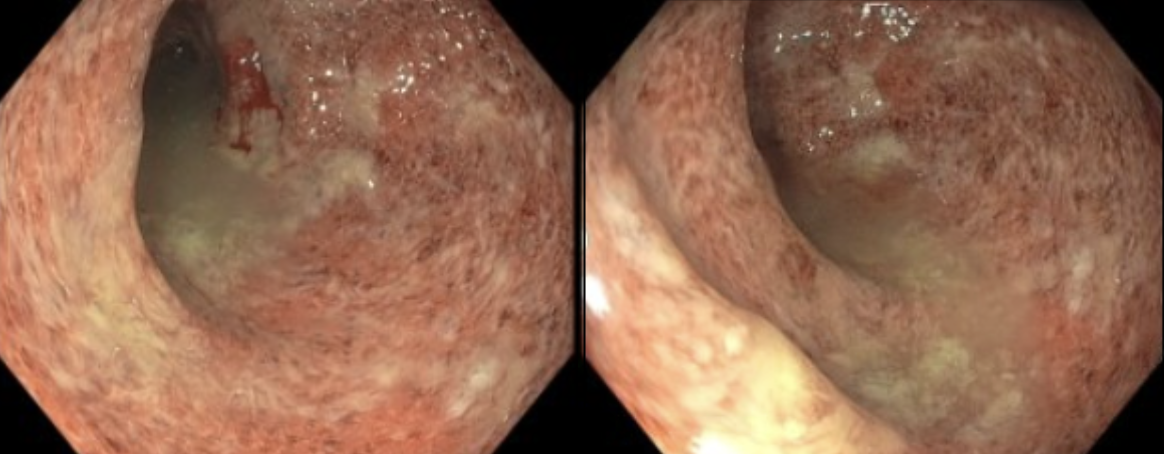Monday Poster Session
Category: IBD
P3403 - An Unusual Diagnosis of IBD in Chromosome 2q37 Microdeletion/Deletion Syndrome
Monday, October 27, 2025
10:30 AM - 4:00 PM PDT
Location: Exhibit Hall

Saman Hamid, MD (she/her/hers)
Charleston Area Medical Center
Charleston, WV
Presenting Author(s)
Saman Hamid, MD, Emily H. Battle, MD, Michael Iannetti, MD, Harleen Chela, MD
Charleston Area Medical Center, Charleston, WV
Introduction: Chromosome 2q37 microdeletion/deletion syndrome is a rare genetic disorder with a wide array of clinical features including facial dysmorphism, intellectual disability, developmental delay, brachydactyly, and congenital heart defects. While there have been 115 reported cases of chromosome 2q37 deletion syndrome, there are no reported cases in the current literature of Inflammatory bowel disease(IBD) in these patients.
Case Description/
Methods: A 21-year-old male with chromosome 2q37 deletion, history of coarctation of aorta status post surgical repair, horseshoe kidney, dysmorphic facial features, autism, and anxiety presented to the hospital with a new onset of abdominal pain, nausea, and bright red bloody diarrhea. There was no significant family history reported.
Labs revealed a hemoglobin of 9.6 g/dL — a 3 g/dL decrease over three months — with significant iron deficiency. Stool studies were negative for infection; however, markers of inflammation were significantly elevated including fecal lactoferrin and calprotectin ( >3000). CT Chest showed a spiculated nodule measuring 1.9 x 1.9 cm in the right lower lobe, which was biopsied. The patient was seen by a gastroenterologist, and he underwent a colonoscopy that showed severe diffuse colitis with erythema, friability, and ulcerations starting from the anal verge itself (Figures 1,2,3). Due to severe inflammatory changes, the colonoscope was not advanced beyond the splenic flexure. Biopsies were obtained that revealed chronic inflammatory changes consistent with ulcerative colitis. The lung nodule biopsy revealed acute and organizing pneumonia with fibrosis and marked lymphoplasmacytic reaction, likely an IBD-associated nodule per Pulmonary team. The patient was started on mesalamine and budesonide, which controlled his symptoms. Since initiation of treatment, he has had significant improvement in his symptoms. An outpatient colonoscopy showed significant endoscopic response to therapy.
Discussion: This case represents, to our knowledge, the first reported instance of ulcerative colitis in a patient with chromosome 2q37 deletion syndrome. While the syndrome is not typically associated with autoimmune gastrointestinal disease, this presentation may indicate a possible link. Given the complex genetic and phenotypic features, further investigation is warranted into potential immunological dysregulation in this population. Clinicians should maintain a high index of suspicion for IBD in these patients, and multidisciplinary care may be beneficial.

Figure: Figure 1 and 2

Figure: Figure 3
Disclosures:
Saman Hamid indicated no relevant financial relationships.
Emily H. Battle indicated no relevant financial relationships.
Michael Iannetti indicated no relevant financial relationships.
Harleen Chela indicated no relevant financial relationships.
Saman Hamid, MD, Emily H. Battle, MD, Michael Iannetti, MD, Harleen Chela, MD. P3403 - An Unusual Diagnosis of IBD in Chromosome 2q37 Microdeletion/Deletion Syndrome, ACG 2025 Annual Scientific Meeting Abstracts. Phoenix, AZ: American College of Gastroenterology.
Charleston Area Medical Center, Charleston, WV
Introduction: Chromosome 2q37 microdeletion/deletion syndrome is a rare genetic disorder with a wide array of clinical features including facial dysmorphism, intellectual disability, developmental delay, brachydactyly, and congenital heart defects. While there have been 115 reported cases of chromosome 2q37 deletion syndrome, there are no reported cases in the current literature of Inflammatory bowel disease(IBD) in these patients.
Case Description/
Methods: A 21-year-old male with chromosome 2q37 deletion, history of coarctation of aorta status post surgical repair, horseshoe kidney, dysmorphic facial features, autism, and anxiety presented to the hospital with a new onset of abdominal pain, nausea, and bright red bloody diarrhea. There was no significant family history reported.
Labs revealed a hemoglobin of 9.6 g/dL — a 3 g/dL decrease over three months — with significant iron deficiency. Stool studies were negative for infection; however, markers of inflammation were significantly elevated including fecal lactoferrin and calprotectin ( >3000). CT Chest showed a spiculated nodule measuring 1.9 x 1.9 cm in the right lower lobe, which was biopsied. The patient was seen by a gastroenterologist, and he underwent a colonoscopy that showed severe diffuse colitis with erythema, friability, and ulcerations starting from the anal verge itself (Figures 1,2,3). Due to severe inflammatory changes, the colonoscope was not advanced beyond the splenic flexure. Biopsies were obtained that revealed chronic inflammatory changes consistent with ulcerative colitis. The lung nodule biopsy revealed acute and organizing pneumonia with fibrosis and marked lymphoplasmacytic reaction, likely an IBD-associated nodule per Pulmonary team. The patient was started on mesalamine and budesonide, which controlled his symptoms. Since initiation of treatment, he has had significant improvement in his symptoms. An outpatient colonoscopy showed significant endoscopic response to therapy.
Discussion: This case represents, to our knowledge, the first reported instance of ulcerative colitis in a patient with chromosome 2q37 deletion syndrome. While the syndrome is not typically associated with autoimmune gastrointestinal disease, this presentation may indicate a possible link. Given the complex genetic and phenotypic features, further investigation is warranted into potential immunological dysregulation in this population. Clinicians should maintain a high index of suspicion for IBD in these patients, and multidisciplinary care may be beneficial.

Figure: Figure 1 and 2

Figure: Figure 3
Disclosures:
Saman Hamid indicated no relevant financial relationships.
Emily H. Battle indicated no relevant financial relationships.
Michael Iannetti indicated no relevant financial relationships.
Harleen Chela indicated no relevant financial relationships.
Saman Hamid, MD, Emily H. Battle, MD, Michael Iannetti, MD, Harleen Chela, MD. P3403 - An Unusual Diagnosis of IBD in Chromosome 2q37 Microdeletion/Deletion Syndrome, ACG 2025 Annual Scientific Meeting Abstracts. Phoenix, AZ: American College of Gastroenterology.
